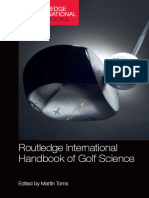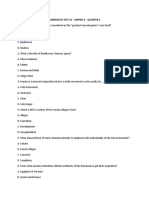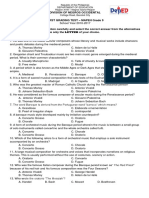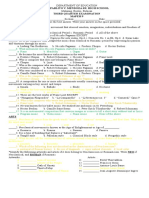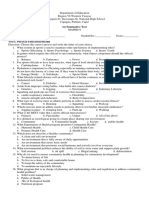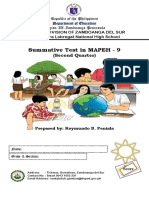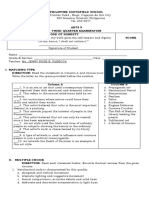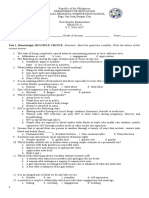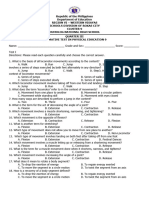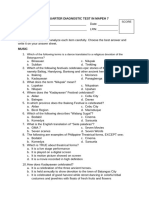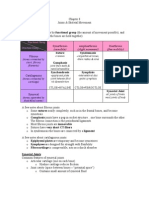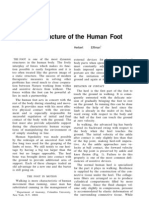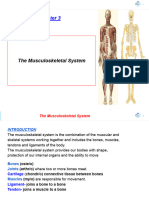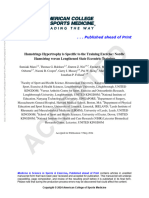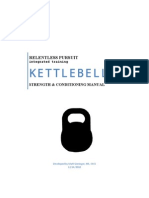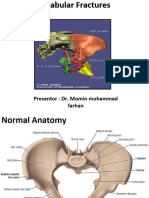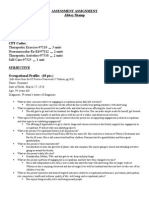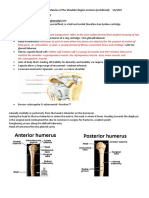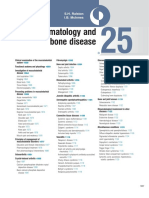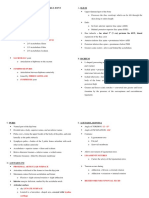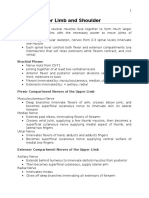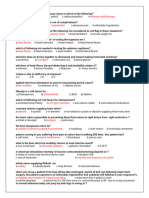100%(1)100% found this document useful (1 vote)
980 views3rd Quarter Summative Test in P
3rd Quarter Summative Test in P
Uploaded by
Edward Llanera Orpilla1. The document contains a 3rd quarter summative test in Physical Education for grade 9.
2. The test has 30 multiple choice questions covering topics like festivals, energy sources, types of dances, benefits of dancing, and components of physical fitness.
3. The questions test different levels of thinking from knowledge to evaluation and cover locomotor movements, joints, muscles, sedentary lifestyle risks, and more.
Copyright:
© All Rights Reserved
Available Formats
Download as DOCX, PDF, TXT or read online from Scribd
3rd Quarter Summative Test in P
3rd Quarter Summative Test in P
Uploaded by
Edward Llanera Orpilla100%(1)100% found this document useful (1 vote)
980 views2 pages1. The document contains a 3rd quarter summative test in Physical Education for grade 9.
2. The test has 30 multiple choice questions covering topics like festivals, energy sources, types of dances, benefits of dancing, and components of physical fitness.
3. The questions test different levels of thinking from knowledge to evaluation and cover locomotor movements, joints, muscles, sedentary lifestyle risks, and more.
Original Title
3rd-Quarter-Summative-Test-in-P.docx
Copyright
© © All Rights Reserved
Available Formats
DOCX, PDF, TXT or read online from Scribd
Share this document
Did you find this document useful?
Is this content inappropriate?
1. The document contains a 3rd quarter summative test in Physical Education for grade 9.
2. The test has 30 multiple choice questions covering topics like festivals, energy sources, types of dances, benefits of dancing, and components of physical fitness.
3. The questions test different levels of thinking from knowledge to evaluation and cover locomotor movements, joints, muscles, sedentary lifestyle risks, and more.
Copyright:
© All Rights Reserved
Available Formats
Download as DOCX, PDF, TXT or read online from Scribd
Download as docx, pdf, or txt
100%(1)100% found this document useful (1 vote)
980 views2 pages3rd Quarter Summative Test in P
3rd Quarter Summative Test in P
Uploaded by
Edward Llanera Orpilla1. The document contains a 3rd quarter summative test in Physical Education for grade 9.
2. The test has 30 multiple choice questions covering topics like festivals, energy sources, types of dances, benefits of dancing, and components of physical fitness.
3. The questions test different levels of thinking from knowledge to evaluation and cover locomotor movements, joints, muscles, sedentary lifestyle risks, and more.
Copyright:
© All Rights Reserved
Available Formats
Download as DOCX, PDF, TXT or read online from Scribd
Download as docx, pdf, or txt
You are on page 1of 2
3rd Quarter Summative Test in P.E.
NAME:_____________________________ Grade&Section:__________________ DATE:_________SCORE:______
I. Multiple Choice: Choose the letter of the correct answer.
1. The following festivals are celebrated in honor of Sto. Niño except one.
a. Ati-Atihan b. Bangus Festival c. Dinagyang Festival d. Sinulog Festival
2. Which of the following is a source of energy which we need in order to perform our daily routine?
a. Bread b. Cereals c. Vegetables d. Meat
3. Which of the following is a cultural dance performed to the strong beats of percussion instruments by a community of people
sharing the same culture usually done in honor of a Patron Saint or in thanksgiving of a bountiful harvest?
a. Cultural dance b. Festival dance c. Folk dance d. Social dance
4. How can festival dancing contribute to one’s fitness and well-being?
a. It reduces the risk of cardio-respiratory diseases. c. It maximizes our use to energy and enhances cardio-respiratory health.
b. It facilitates teamwork and sense of community. d. It is good form of exercise.
5. Each festival is uniquely different with the other festivals. What do you call the gathering and battle of all festivals within the
country?
a. Aliwan festival b. Dinagyang festival c. Festival of festivals d. Mother of all festivals
6. If an individual could hardly catch his breath off while performing festival dances, what is the intensity of his activity?
a. Heavy b. Light c. Moderate d. Moderately light
7. How can one benefit from festival dancing activities?
a. They help one achieve a personality active lifestyle.
b. They contribute to the enhancement of community awareness.
c. They develop one’s awareness of his own and other’s culture through festivals.
d. All of the above
8. This element refers to the scope of movement execution,It is dictated by the space provided.
a. Range b. level c. Focus d. Rhythm
9. The following except one may result from having a sedentary lifestyle.
a. Overweight and obesity b. Lung cancer c. Coronary artery and coronary heart disease d. Diabetes
10. These are movements that allow you to move from one point in space to another.
a. Locomotor movements b. Religious festivals c. Non-locomotor movements d. Warm-up exercise
11. Which of the following is an example of a religious festival?
a. Panagbenga festival b. Peñafrancia c. T’ nalak festival d. Ammungan festival
12. The pace of origin of Ati-Atihan Festival
a. Dagupan City b. Cebu City c. Kalibo, Aklan d. Tacloban City
13. Which of the following is an example of non-religious festivals ?
a. Higante festival b. Sinulog festival c. Kinabayo festival d. Mango festival
14. What is the name of Festival in Iloilo City usually celebrated in January?
a. Binatbatan b. Pattarradday c. Dinagyang d. Bambanti
15. This movement is simply described by having both feet lose its contact with the ground.
a. Walk b. Jump c. Run d. Step
16. It is the act of decreasing the angle of a joint.
a. Flexion b. Extension c. Release d. Trust
17. The basis of all locomotor movements.
a. Walk b. Jump c. Run d. Step
18. The following are popular festivals in Pangasinan except one.
a. Bangus festival b. Mango festival c. Bagoong festival d. Pindang festival
19. What religious figure honored in Sangyaw Festival.
a. Sto. Nino b. James the Great c. Saint Paul d. Virgin Mary
20. Refers to deliberately drop or exertion to energy into a body segment.
a. Collapse b. Twist c. Extension d. Recover
II. Identify the following.
21. It is the act of decreasing the angle of joint.
22. It refers to deliberately drop the exertion of energy into a body segment.
23. These are movements that performed in one point in space without transferring to another point.
24. A muscle movement done when it shortens, narrows and tightens using sufficient amount of energy in the
execution.
25. To move a body segment from an axis halfway front or back or quarter to the right or left as in the twisting of the
neck allowing the head to face right or left and the like.
26. This refers as the opposite of collapse.
27. These are the basis of all locomotor movements.
28. This movement is simply described by having both feet lose its contact with the ground.
29. These are movements that allow you to move from one point in space to another
30. A muscle movement opposite to contraction done when it let goes or let looses of being held into a shortening
movement.
Prepared by: Noted:
TRUFIMO L. CAMARAO MARIA LUISA A. LACSAMANA, PhD.
Master Teacher I MAPEH/ C.A.T. Head Teacher VI
MAPEH 9 (PHYSICAL EDUCATION)
S.Y. 2019 - 2020
TABLE OF SPECIFICATION
THIRD QUARTER
LEVELS OF QUESTIONING TEST ITEMS
1. Knowledge/ memory 1,5,12,13,14,17,20,25,26,30
2. Comprehension 15,16,23,24
3. Applications 3,12,18,19,21,22,28
4. Analysis 2,8,27
5. Synthesis 4,7,9,29
6. Evaluation 6,10
You might also like
- Routledge International Handbook of Golf Science First Edition 9781138189126 113818912x CompressDocument491 pagesRoutledge International Handbook of Golf Science First Edition 9781138189126 113818912x CompressBenjapol BenjapalakornNo ratings yet
- Second Diagnostic Test in Mapeh 9Document2 pagesSecond Diagnostic Test in Mapeh 9Mina Berdos Sabit100% (3)
- Arts For Grade 10 Third Quarter ExaminationDocument3 pagesArts For Grade 10 Third Quarter ExaminationPanut SarteNo ratings yet
- Special TestsDocument10 pagesSpecial TestsAdrian Nasager100% (5)
- Mapeh 9 Summative TestDocument2 pagesMapeh 9 Summative TestAira A. Baylan100% (2)
- PE 3rd PERIODIC TESTDocument3 pagesPE 3rd PERIODIC TESTrachel100% (1)
- SUMMATIVE TEST Quarter 4 Mapeh 9Document3 pagesSUMMATIVE TEST Quarter 4 Mapeh 9Mary Cris100% (1)
- 3rd QE 9Document3 pages3rd QE 9Gilea PalerNo ratings yet
- 4th-QUARTER-long Quiz PE 9Document2 pages4th-QUARTER-long Quiz PE 9ronaNo ratings yet
- Fourth Quarter Examination in Mapeh IxDocument1 pageFourth Quarter Examination in Mapeh IxFatima Lagapa100% (4)
- Tipas National High School: Prelim in MAPEH GRADE 9Document3 pagesTipas National High School: Prelim in MAPEH GRADE 9Myra Paitan IliganNo ratings yet
- 4th Quarter Exam Grade 9Document2 pages4th Quarter Exam Grade 9Noemi Balbido100% (2)
- Second Quarter Quiz PeDocument2 pagesSecond Quarter Quiz PeRodRigo Mantua Jr.No ratings yet
- Summative Test 3rdDocument3 pagesSummative Test 3rdDhennis Kurt Lagoy100% (1)
- 2nd Periodical Exam 2019 2020Document3 pages2nd Periodical Exam 2019 2020Cherilyn DequitNo ratings yet
- THIRD PERIODICAL TEST IN MAPEH 9.editedDocument4 pagesTHIRD PERIODICAL TEST IN MAPEH 9.editedRhea Meszurika TambobongNo ratings yet
- Music 9 - Q3 TosDocument2 pagesMusic 9 - Q3 TosKatherine Pagas Galupo100% (1)
- 2nd Periodical Test in Mapeh 9 FinalDocument5 pages2nd Periodical Test in Mapeh 9 FinalNube Sempai100% (4)
- Activity Sheets in HEALTH 2nd QUARTERDocument5 pagesActivity Sheets in HEALTH 2nd QUARTERArlene Beltran - Sevillena100% (1)
- Third Periodical Test in Mapeh 9&10Document9 pagesThird Periodical Test in Mapeh 9&10RhonaVillanuevaLayco100% (1)
- Summative Test 2 Mapeh 9 Quarter 2Document4 pagesSummative Test 2 Mapeh 9 Quarter 2ROBERT JOHN PATAG75% (4)
- Grade 9 Exam 4rth QuaterDocument3 pagesGrade 9 Exam 4rth QuaterJasper Rex Ramirez100% (1)
- Summative Test in Music 9 (First Quarter) : Republic of The Philippines Department of EducationDocument3 pagesSummative Test in Music 9 (First Quarter) : Republic of The Philippines Department of EducationLouie James Fernandez100% (3)
- 2nd Quarter Summative Test in MAPEH 9 2021Document2 pages2nd Quarter Summative Test in MAPEH 9 2021Manny Diaz67% (3)
- MAPEH 9 Diagnostic ExaminationDocument3 pagesMAPEH 9 Diagnostic ExaminationlaizahernandezNo ratings yet
- MAPEH 9 Second Quarter - RemedialDocument13 pagesMAPEH 9 Second Quarter - RemedialMELAIDA CASTANAR GARIBAYNo ratings yet
- Mapeh 9Document4 pagesMapeh 9kevin100% (1)
- Summative Assessment in Pe Quarter 2Document2 pagesSummative Assessment in Pe Quarter 2Marianne Agaya100% (1)
- 2nd Periodical Exam MAPEH 9Document5 pages2nd Periodical Exam MAPEH 9Brix MallariNo ratings yet
- 3rd Quarter Exam Mapeh 10Document3 pages3rd Quarter Exam Mapeh 10Dhan Mark BarlintangcoNo ratings yet
- Assessment in Health 9 2nd QuarterDocument2 pagesAssessment in Health 9 2nd QuarterLj Cortez Cagunot50% (2)
- PT 3rd Mapeh 9Document2 pagesPT 3rd Mapeh 9Calvin Cabacungan100% (2)
- Second Quarter Performance SY 2020-2021: Criteria Quality of ArtworkDocument1 pageSecond Quarter Performance SY 2020-2021: Criteria Quality of ArtworkArvin AguilarNo ratings yet
- Physical Education 9 (Week 2-8) : Social Dances and Dance MixersDocument4 pagesPhysical Education 9 (Week 2-8) : Social Dances and Dance Mixersfe delgado100% (1)
- Assessment in MAPEH 9 LAS 3.1Document2 pagesAssessment in MAPEH 9 LAS 3.1Allysa Rotubio EmbudoNo ratings yet
- Summative Test Week 1 - 4 P.EDocument2 pagesSummative Test Week 1 - 4 P.ECherrina Aguila100% (1)
- Summative Assessment g9 Health 4th QuarterDocument1 pageSummative Assessment g9 Health 4th QuarterMacoy LasqueNo ratings yet
- 3rd Quarter Exam MAPEH 9Document3 pages3rd Quarter Exam MAPEH 9mae santos0% (1)
- Music 10 - Summative Test - 4th Final 10 ItemsDocument1 pageMusic 10 - Summative Test - 4th Final 10 ItemsLeil Riego100% (1)
- 1st SUmmative Test in Mapeh 9Document2 pages1st SUmmative Test in Mapeh 9Cristena Delos Santos Deondo89% (9)
- 2ndQ Pandemic Summative Test in MAPEH-9Document4 pages2ndQ Pandemic Summative Test in MAPEH-9Reymundo PenialaNo ratings yet
- MAPEH 10 1st Summative TestDocument3 pagesMAPEH 10 1st Summative TestAshierah MontasNo ratings yet
- Activity 3.10 Summative Test in PEDocument1 pageActivity 3.10 Summative Test in PEaileenNo ratings yet
- Arts 9 3rd Quarter ExamDocument4 pagesArts 9 3rd Quarter ExamJenny Rose Pabecca100% (5)
- Summative Test Grade 9 (Music) : Department of EducationDocument2 pagesSummative Test Grade 9 (Music) : Department of EducationJunard CenizaNo ratings yet
- 2nd Quarter Summative Test in MAPEH 9 ......Document4 pages2nd Quarter Summative Test in MAPEH 9 ......koi100% (1)
- Summative Test in MUSIC 9 3rd QuarterDocument3 pagesSummative Test in MUSIC 9 3rd QuarterRica TanoNo ratings yet
- 1st SUMMATIVE TEST IN HEALTH 9 Q2Document5 pages1st SUMMATIVE TEST IN HEALTH 9 Q2Sabnahis Batongbuhay Extension100% (2)
- 4TH Quarter - 9 MusicDocument12 pages4TH Quarter - 9 MusicLynn Roa Dagsa - Miniao100% (1)
- MAPEH 9 PE and Halth 2nd Quarter Examination FinalDocument2 pagesMAPEH 9 PE and Halth 2nd Quarter Examination Finalcecile80% (10)
- Fourth Periodic Test in MAPEH 9Document3 pagesFourth Periodic Test in MAPEH 9Jovelyn Takilid100% (1)
- NAME: - SECTION: - Quarter 1 - Summative Test MAPEH G9 2021 - 2022Document2 pagesNAME: - SECTION: - Quarter 1 - Summative Test MAPEH G9 2021 - 2022raquel100% (1)
- Health 8 - 1st Grading ExamDocument3 pagesHealth 8 - 1st Grading Exammaria luz100% (2)
- Test I-Multiple Choice. Read Each Statement Carefully and Choose The Letter That Best Corresponds To TheDocument3 pagesTest I-Multiple Choice. Read Each Statement Carefully and Choose The Letter That Best Corresponds To TheMarie Sha Alojado0% (1)
- Week 2 PPT HEALTH 9Document27 pagesWeek 2 PPT HEALTH 9REYES, MARK VINCENT M.100% (1)
- Pretest Posttest Mapeh 9.Document2 pagesPretest Posttest Mapeh 9.Konoha Maru100% (3)
- 4th Periodical Test in MAPEH 9 - 2018-2019Document4 pages4th Periodical Test in MAPEH 9 - 2018-2019Melody Joy Amosco100% (1)
- MAPEH-9 1st Quarter Summative TestDocument3 pagesMAPEH-9 1st Quarter Summative TestJethromelech Rodriguez100% (3)
- Mapeh 9 - Pre AssessmentDocument4 pagesMapeh 9 - Pre AssessmentDW7 EYHNo ratings yet
- Q3summative Test in Health 9Document6 pagesQ3summative Test in Health 9Lizlee De JoseNo ratings yet
- Q4 ASSESSMENT - MAPEH 7 - Test QuestionnaireDocument4 pagesQ4 ASSESSMENT - MAPEH 7 - Test QuestionnaireDavid Joshua RosalesNo ratings yet
- Grade 12 Assessment Tool First QuarterDocument7 pagesGrade 12 Assessment Tool First QuarterRowena FloresNo ratings yet
- Functional Movement Assessment Score SheetDocument1 pageFunctional Movement Assessment Score Sheetapi-513768116No ratings yet
- PANat - Thetrical - Air Splints - Talas Pneumaticas Margaret JohnstoneDocument44 pagesPANat - Thetrical - Air Splints - Talas Pneumaticas Margaret JohnstonePedro GouveiaNo ratings yet
- Acute Knee Injury General ExercisesDocument2 pagesAcute Knee Injury General ExercisesDevi SiswaniNo ratings yet
- Hip and FootDocument14 pagesHip and FootKoj Lozada100% (1)
- Lacerated WoundDocument38 pagesLacerated Wounddomzlr18100% (2)
- Chapter 8 MariebDocument5 pagesChapter 8 MariebmjhenkeNo ratings yet
- Dynamic Structure of The Human Foot Herbert and ElftmanDocument10 pagesDynamic Structure of The Human Foot Herbert and ElftmantriptykhannaNo ratings yet
- Muscle Grading and Testing ProceduresDocument5 pagesMuscle Grading and Testing ProceduresJessRomaNo ratings yet
- Revised Chapter - 3 - Google Slide - The Musculoskeletal SystemDocument26 pagesRevised Chapter - 3 - Google Slide - The Musculoskeletal SystemJaded KaysarNo ratings yet
- Hamstrings Hypertrophy Is Specific To The Training.551Document57 pagesHamstrings Hypertrophy Is Specific To The Training.551alexandremagnopersonal100% (1)
- Kettlebell Strength and Conditioning ManualDocument21 pagesKettlebell Strength and Conditioning ManualMatthew Gieringer100% (5)
- Part 4 - Planning and Training U.S. Soccer Coaching CurriculumDocument50 pagesPart 4 - Planning and Training U.S. Soccer Coaching Curriculumriverbendfc100% (3)
- Acetabular FracturesDocument69 pagesAcetabular Fracturesmohammad farhanNo ratings yet
- Abbey-Adult Assessment AssignmentDocument6 pagesAbbey-Adult Assessment Assignmentapi-284725158No ratings yet
- Fundamentals of Nursing 1Document2 pagesFundamentals of Nursing 1Alura Marez Doroteo100% (2)
- Ortho SummariesDocument6 pagesOrtho Summariesbalkrishna.narshaiNo ratings yet
- 5Hgjkv-Functional Reach TestDocument3 pages5Hgjkv-Functional Reach Testedi_wsNo ratings yet
- HUBS1105 Glenohumeral Joint and Muscles of The Shoulder Region Lectures CombinedDocument7 pagesHUBS1105 Glenohumeral Joint and Muscles of The Shoulder Region Lectures CombinedChloe HeuchanNo ratings yet
- .Archmatt Wenning - 10 Week at Home WorkoutDocument23 pages.Archmatt Wenning - 10 Week at Home Workoutarthax123100% (2)
- Rehabilitation For Hip Arthros PDFDocument4 pagesRehabilitation For Hip Arthros PDFMónica Sabogal JaramilloNo ratings yet
- Davidson's Rheuma + NeuroDocument190 pagesDavidson's Rheuma + NeuroANDRE MANo ratings yet
- Diabetes Examination: General Appearance/InspectionDocument5 pagesDiabetes Examination: General Appearance/InspectionNadia SalwaniNo ratings yet
- MMT Neck An Trunk-FixDocument49 pagesMMT Neck An Trunk-FixLAMODAYAHOO.COMNo ratings yet
- Effect of Proprioceptive Exercise OnDocument35 pagesEffect of Proprioceptive Exercise OnbutowskiNo ratings yet
- Hip Joint PDFDocument11 pagesHip Joint PDFStephen Subiera MiayoNo ratings yet
- MSK IV: Upper Limb and Shoulder: Brachial PlexusDocument7 pagesMSK IV: Upper Limb and Shoulder: Brachial PlexusKevin Yixi RenNo ratings yet
- Synopsis Adiba Ahmed (MPT 1st Year)Document13 pagesSynopsis Adiba Ahmed (MPT 1st Year)mohd asadNo ratings yet
- Dha Exam With AnswersDocument32 pagesDha Exam With AnswersHibaKhanNo ratings yet
